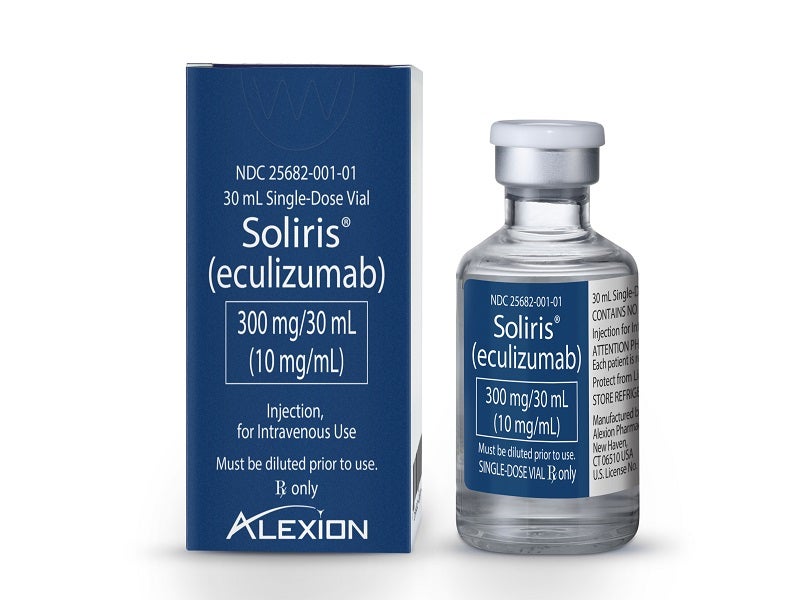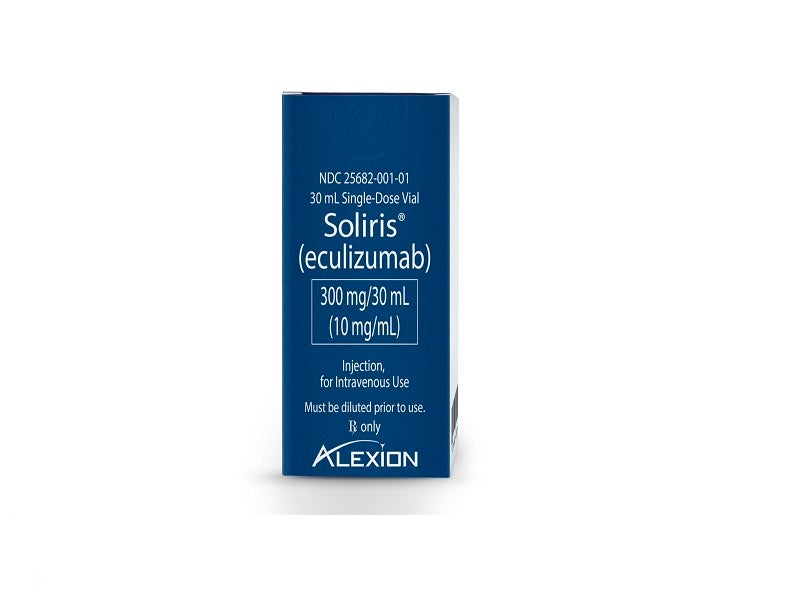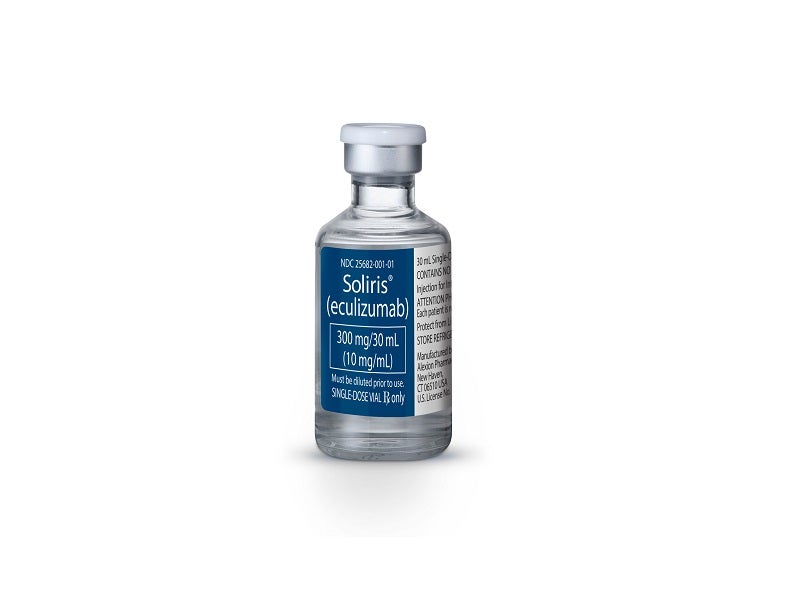Soliris® (eculizumab) is a monoclonal antibody indicated for the treatment of rare and severe blood disorders, including paroxysmal nocturnal haemoglobinuria (PNH) and atypical haemolytic uraemic syndrome (aHUS).
It is also indicated to treat rare autoimmune disorders such as generalised myasthenia gravis (gMG) and neuromyelitis optica spectrum disorder (NMOSD).
The drug is developed and manufactured by Alexion Pharmaceuticals, a biopharmaceutical company based in the US and a subsidiary of AstraZeneca.
Soliris is available as a sterile, colourless, clear solution in a single-dose vial in 300mg/30ml (10mg/ml) dosage strength for intravenous infusion.
Regulatory approvals for Soliris
The National Medical Products Administration (NMPA) in China authorised Soliris for treating NMOSD in adults who are anti-aquaporin-4 (AQP4) antibody-positive in October 2023, based on results of the Phase III PREVENT clinical trial.
The Japanese Ministry of Health, Labour and Welfare (MHLW) approved the drug for paediatric patients with gMG who are anti-acetylcholine receptor (AChR) antibody-positive in August 2023.
The European Union (EU) sanctioned the drug’s use in children and adolescents with refractory gMG in July 2023.
In June 2023, Soliris was approved in China for the treatment of refractory gMG in AChR antibody-positive adults, based on the Phase III REGAIN trial results.
The US Food and Drug Administration (FDA) approved the drug for treating NMOSD in adults who are AQP4 antibody-positive in June 2019, while the European Commission (EC) granted marketing authorisation for the same indication in August 2019.
Japan’s MHLW approved the drug for NMOSD relapse prevention in November 2019.
Soliris was approved by the FDA for gMG in AChR antibody-positive adults in August 2017 and by the EC in October 2017.
The Japanese MHLW sanctioned its use in patients with difficult-to-control symptoms despite high-dose IVIG therapy or plasmapheresis in December 2017.
The drug is also approved in the European Union, Canada, and Japan for the treatment of PNH, aHUS, and gMG. The drug was made available in Australia for PNH treatment in February 2009, following the initial FDA approval for the same indication in 2007. Soliris was designated as an orphan drug by the FDA in October 2003.
Additionally, Soliris is being explored as an experimental emergency treatment for Covid-19 infection and severe pneumonia in a limited number of patients, with its potential role or efficacy still under investigation.
Causes of PNH, aHUS, gMG and NMOSD
PNH and aHUS are caused due to defects in protein (CD59) present on the surface of red blood cells (RBCs). The protein hinders complement protein from attacking the cells, thereby destroying RBCs.
PNH is the breakdown of the RBC at an early stage. It usually occurs in people with the missing PIG-A gene, which helps proteins stick to the RBC. In the absence of PIG-A, the proteins cannot stick to the cells, resulting in the breaking down of RBCs.
aHUS is a chronic illness in which a genetic deficiency may lead to uncontrolled activation of complement protein, causing small clots to form in blood vessels all over the body.
The uncontrolled complement activation may lead to reduced platelet count (thrombocytopaenia) and the destruction of RBCs. It may also cause damage to many vital organs, including the kidneys, brain and heart.
gMG is a chronic autoimmune neuromuscular disease, which begins with muscle weakness around the eyeballs and eyelids and leads to weakness in the head, neck, limb and respiratory muscles. It occurs due to the generation of antibodies by the patient’s own body to attack the AChR receptor present in the muscle cells of the neuromuscular junction.
NMOSD is a rare, debilitating disorder that affects the central nervous system, particularly the optic nerves and spinal cord. In this condition, the patient’s own body generates auto-antibodies against the AQP4 protein. The protein is present in the nerve cells of the eyes, brain and spinal cord for its growth and survival. The AQP4 auto-antibodies destroy the essential cells in the CNS and neurons, causing symptoms such as vision loss, paralysis, and other neurological complications.
Soliris’ mechanism of action
Eculizumab is a first-in-class C5 complement inhibitor. It functions by inhibiting the C5 protein within the terminal complement cascade, an integral component of the body’s immune system.
When this cascade becomes overly activated, it triggers an excessive immune response, causing the body to mistakenly target its own healthy cells.
Clinical trials in PNH patients
Soliris has demonstrated efficacy and safety in treating PNH through three multi-national clinical studies. The 26-week Phase III TRIUMPH placebo-controlled trial involved 87 patients while the 52-week SHEPHERD open-label Phase III trial included 97 patients. Additionally, the long-term extension study E05-001 further supported the findings from the trial.
The primary endpoint of reduced haemolysis was consistently met across the studies, with a significant decrease from a baseline lactate dehydrogenase level (LDH) level of 2,032u/l to 239u/l at week 26. The reduction was rapid, occurring within the first week of treatment, and was maintained for up to 54 months with ongoing Soliris therapy. As a result of decreased haemolysis, there was an increase in circulating PNH cells and an improvement in haemoglobin levels.
Furthermore, the co-primary endpoints of haemoglobin stabilisation and reduction in the need for RBC transfusions were achieved. About 50% of the Soliris-treated patients experienced haemoglobin stabilisation, in stark contrast to none in the placebo group. The median number of transfusions dropped from ten units per patient to zero. Patients on Soliris also reported less fatigue and an enhanced health-related quality of life. Additionally, the incidence of thrombotic events was reduced during Soliris treatment compared to the period before treatment.
Clinical trials in aHUS patients
The FDA’s approval of Soliris for aHUS was based on three Phase II studies conducted to evaluate the drug’s safety and efficacy in aHUS patients undergoing plasma therapy, paediatric aHUS patients and plasma therapy-resistant patients, respectively.
The first Phase II study enrolled 17 plasma therapy-resistant or sensitive patients. Haematologic normalisation was observed in 76% of the patients. Around 87% of the patients treated with Soliris achieved thrombotic microangiopathy (TMA) free status.
The second trial was conducted in aHUS patients undergoing plasma therapy. It enrolled 20 patients, 80% of whom achieved TMA-free status. Haematologic normalisation was observed in 90% of the patients.
The third trial recruited 19 paediatric aHUS patients. Haematologic normalisation was reported in 89% of the patients.
Clinical trials in gMG and NMOSD patients
The FDA’s approval of the drug for gMG was based on a Phase III, randomised, double-blind, placebo-controlled, multi-centre clinical study named REGAIN. The approval for NMOSD was based on the results of PREVENT, a Phase III, randomised, double-blind, placebo-controlled study.
The 26-week REGAIN Phase III randomised, double-blind, placebo-controlled, multi-centre clinical study, enrolled 125 gMG patients. The trial’s primary endpoint was the change in the total score of the MG-Specific Activities of Daily Living scale (MG-ADL). The total score was -4.2 in Soliris-treated patients compared with -2.3 in patients receiving a placebo. A lower score indicates a better clinical outcome.
A total of 143 NMOSD patients were enrolled in the PREVENT Phase III randomised, double-blind, placebo-controlled trial. In the trial, Soliris demonstrated efficacy in meeting its primary endpoint by prolonging the time to the first adjudicated relapse and reducing the risk of relapse.
After 48 weeks of treatment, 98% of patients administered Soliris remained relapse-free, compared to only 63% of those who received a placebo. Furthermore, at 144 weeks, 96% of patients treated with Soliris remained relapse-free, contrasting with just 45% of patients who received a placebo.





